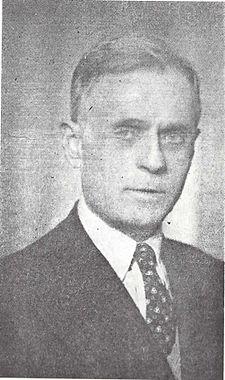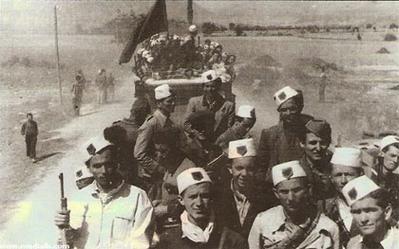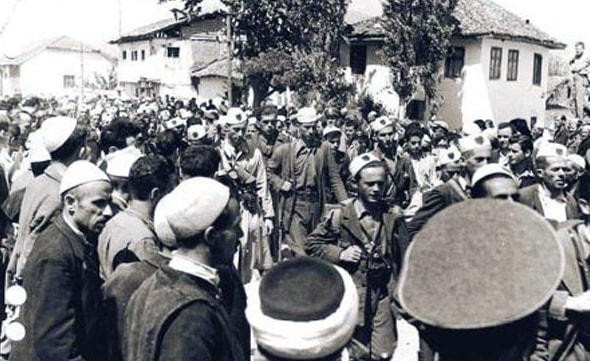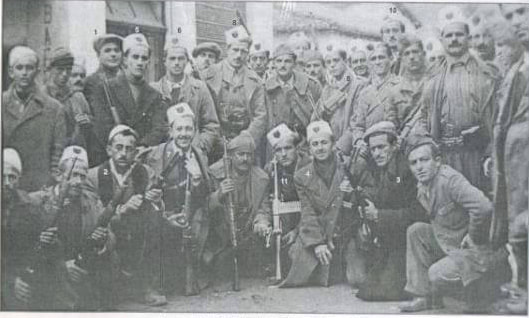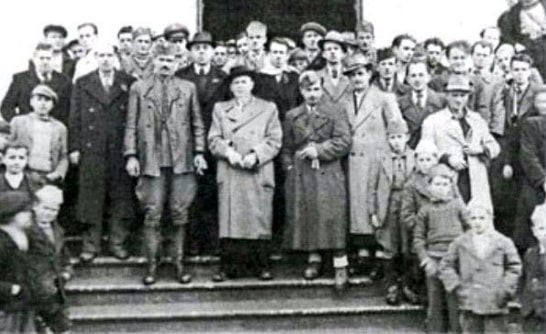Balli Kombëtar (National Front)
|
The Balli Kombëtar (National Front), known as Balli, was an Albanian nationalist anti-communist resistance movement and a political organization established in November 1942. It was led by Ali Këlcyra and Midhat Frashëri and was formed by members from the landowning elite, liberal nationalists opposed to communism and other sectors of society in Albania. The motto of the Balli Kombëtar was: "Shqipëria Shqiptarëve, Vdekje Tradhëtarëve" (Albania for the Albanians, Death to the Traitors). Eventually the Balli Kombëtar joined the Nazi established puppet government and fought as an ally against anti-fascist guerrilla groups.
History With Italy on the brink of defeat in 1943, the Albanian National Liberation Movement (LNC) and the Balli Kombëtar organized a meeting in the village of Mukje. The Balli Kombëtar entered into a fragile alliance with the communist-led LNC, and acted as a resistance group against the Italians. Following the Mukje Agreement, the vague mutual tolerance that had existed between the Ballists and Communists quickly evaporated. The Allies too could not guarantee that Kosovo would be a part of Albania, because they stood for the restoration of occupied nations under their borders as they existed prior to World War II. Despite their lukewarm attitude towards the Allies, the Ballists feared that an Allied victory in the war might well result in Communist control of Albania. Their lukewarm attitude towards the British was also fostered by their desire to preserve the occupied united Albanian state under the borders drawn by the Italians in 1941, for they bitterly opposed and dreaded the loss of Kosovo and Debar to Yugoslavia once again, and feared that the Allies in their support of the Greeks might prevent them from claiming Chameria and deprive them of their southern provinces of Korçe and Gjirokaster, the heartland of their liberation movement. They regarded the Yugoslavs and the Greeks as their real enemies. The Mukje Agreement immediately triggered a hostile reaction from the Yugoslav representative in Albania, Svetozar Vukmanoviċ. He denounced the agreement and put pressure on the LNC to repute it immediately, and Yugoslav Communist leader Milovan Đilas subsequently described the Balli Kombëtar as "Albanian Fascists". The Balli Kombëtar, which had fought against the Italians, were threatened by the superior forces of the LNC and the Yugoslav Partisans, who were backed by the Allies. In the autumn of 1943, Nazi Germany occupied all of Albania after Italy was defeated. Fearing reprisals from larger forces, the Balli Kombëtar made a deal with the Germans and formed a "neutral government" in Tirana which continued its war with the LNC and the Yugoslav Partisans. Albania Safet Butka, a hardline Albanian nationalist, tried at various times to cooperate with the Communist-dominated Liberation Front. By January 1943, in Southern Albania, some Partisan units fought alongside the Balli Kombëtar during the Battle of Gjorm where they defeated and routed the Italian troops. In February 1943, he organized a meeting with Communist representatives and an agreement for cooperation was reached in March 1943. He also made another local agreement in August 1943 and was one of the initiators and supporters of the Mukje agreement. The Albanian Communists had demanded that Kosovo and Metohija be ceded to Albania after the war. The LANÇ met with the Ballists in August 1943, agreeing upon the establishment of Greater Albania. The agreement was however short-lived. After the denouncement of the Mukje agreement by Albanian communists, he feared a civil war between Albanians and when asked on the matter, always stated that "the only Albanian that I will kill will be myself." On his way home, he was informed of the first clashes between Albanian partisans and the Balli Kombëtar. Upon hearing such news, he killed himself on 19 September 1943 in the village of Melçan, faithful to his word. In the south of Albania, the rivalry between the Communists and the Balli Kombëtar heated up. The Communists almost immediately repudiated the Mukaj agreement, and fearing the British might open a second front in the Balkans and lend their support to the Ballists, they issued orders that the Balli Kombëtar be eliminated wherever it was found. These factors contributed to members of the Balli Kombëtar forming a strong hatred for the Communists. After forming the collaborator government, the Ballists pressed hard against the Communists. They destroyed a fairly large Communist partisan group southwest of Tirana. By the Fall of 1943 the Ballists, assisted by German forces, were also involved in vicious fighting against the Northern Epirus Liberation Front in Southern Albania. This Greek Nationalist group was destroyed during these clashes and was eliminated as a fighting force. With the Grand Alliance established, the Germans began losing the war. This also affected the situation in Albania as the Germans could not supply the Ballists. With the current situation favouring the Communists, the partisans began a full-scale attack on the Balli Kombëtar. British liaison officers in Albania noted that the Communists were using the arms they received to fight fellow Albanians far more than to harass the Germans. The west noted that the Communists could not have won without the supplies and armaments from the British, America and Yugoslavia, and that the LNC were not afraid of murdering their own countrymen. Kosov and Macedonia The Ballists in Kosovo and Western Macedonia rose to prominence following the capitulation of Italy in September 1943. They seized Struga and Debar from the Italians on 9 September 1943, taking much of the military equipment left behind. Following the establishment of the Albanian Kingdom, leading members of the Balli Kombetar from Kosovo became involved in forming the new government. On 6 November 1943, Berlin announced that the regents and the assembly had formed a government headed by Kosovar Albanian Rexhep Mitrovica, who had joined the Balli Kombëtar resistance movement in 1942 and spent much of the Italian period in prison in Porto Romano near Durrës. Mitrovica's cabinet, most of whom had credentials as nationalists as well as some German or Austrian connection, included Xhafer Deva. Deva, a leading Ballist also from Kosovo, was appointed Minister of the Interior in the Government of Rexhep Mitrovica and collaborated with the Germans to oppose the spread of Communist forces in the north, effectively giving him direct command over the forces of the new government. The fighting in Kosovo took on an ethnic and ideological basis with the Albanian Balli Kombetar forces fighting the predominantly Serb Partisans. In Western Macedonia, when it was a part of the independent state of Albania, the German and Ballist forces had occasional skirmishes with Yugoslav partisans. Kicevo, which remained in the hands of Macedonian and Albanian Partisan units following the capitulation of Italy, was attacked by the Ballists of Xhem Hasa in early November 1943. After 7 days of fierce fighting, the Partisans were defeated and forced to retreat from the city. Fiqri Dine, Xhem Hasa and Hysni Dema as well as three German Majors also directed military campaigns against the Albanian and Yugoslav partisans. When Maqellarë, midway between Debar and Peshkopi, was recaptured by the Fifth Partisan Brigade, the Germans with the assistance of the Ballist forces of Xhem Hasa launched an attack from Debar, defeating the partisans. The main centres of the Balli Kombëtar in these regions were Kosovska Mitrovica, Drenica and Tetovo. It was noted that the Balli Kombëtar in these regions were more aggressive than the Ballists of Albania. With the tables now turned in their favour many Ballists saw an opportunity to take their revenge upon their Serbian neighbours for the suffering they had endured over previous two decades (Massacres of Albanians in the Balkan Wars), burning perhaps as many as 30,000 houses belonging to Serbs and Montenegrins. Most vulnerable to these attacks were Serbs who had settled in Kosovo in the interwar period. In October 1944, as the German Army began retreating through Kosovo, fierce battles between the Germans and the Partisans broke out. After the Germans had been driven out, Tito ordered the collection of weapons in Kosovo and the arrest of prominent Albanians. The order was not well received and, combined with passions felt about Kosovo, inflamed an insurrection. On 2 December 1944, anti-communist Albanians from the Drenica region attacked the Trepca mining complex and other targets. Numbering at most 2,000 men, these anti-communists managed to hold off a Partisan force of 30,000 troops for two months. Similarly in Kičevo, Gostivar and Tetovo, the remaining Ballists tried to remain in control of the region after the Yugoslav Partisans announced victory. Now "an armed uprising of massive proportions" broke out in Kosovo led by the Balli Kombëtar (which still had around 9,000 men under arms at the time), which aimed to resist incorporation of Kosovo into communist Yugoslavia. It was only in July 1945 that the Yugoslav Partisans were able to put down the uprising and establish their control over Kosovo. Montenegro and Sandzak Regions Parts of Montenegro and the Sandžak were annexed into Albania in 1941. Some of the Yugoslav Muslims that lived in these regions sided with the Albanians. Acif Hadziahmetovic, former mayor of Novi Pazar and member of Nexhip Draga's party, and Ballist forces under Shaban Polluzha successfully repelled the combined Chetnik-Yugoslav Partisan forces back from Novi Pazar, and crushed their stronghold in Banja. Novi Pazar remained under the control of Acif Hadziahmetovic who was a member of the nationalist Balli Kombëtar movement, right up until December 1944. During this time the region between Ballist held Novi Pazar and Chetnik controlled Raška, witnessed constant fighting between the Albanians, Yugoslav Muslims and Serbs in the narrow valley that separates the two towns. Greece The Balli Kombëtar were also active in the Northwestern region of Greece, referred to by Albanians as Chameria. Administration of the Thesprotia prefecture was handed over to the Albanians, although this region was not officially annexed into the Albanian kingdom. The "Balli Kombëtar Çam" (Cham National Front), founded in 1943 by Nuri Dino, received full German support since they were willing to fight both Albanian and Greek Communist Partisans. These units were used in anti-partisan operations in Greece codenamed Augustus. By the time Operation Augustus ended, a larger number Chams were recruited for armed support. Their support was appreciated by the Germans: Lt Colonel Josef Remold remarked that "with their knowledge of the surrounding area, they have proved their value in the scouting missions". On several occasions these scouting missions engaged EDES units in combat. On 27 September (1943), combined German and Cham forces launched large scale operation in villages north of Paramythia: Eleftherochori, Seliani, Semelika, Aghios Nikolaos. In this operation the Cham contingent numbered 150 men, and, according to German Major Stöckert, "performed very well". See Also |

